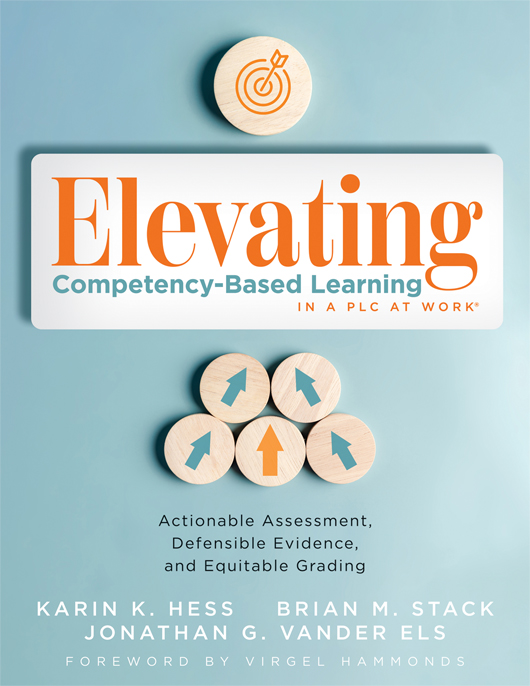Free Reproducibles
Elevating Competency-Based Learning in a PLC at Work®
Free Reproducibles
Actionable Assessment, Defensible Evidence, and Equitable Grading
Build a defensible body of evidence for every student. The IMPACT framework and the seven design principles of competency-based learning, as presented in this book, make this practical and doable for professional learning communities. This framework helps with clarifying learning expectations, planning assessments, and establishing protocols for proficient performance.
- Learn how IMPACT can help build a rock-solid body of evidence, ensuring their schools meet all accountability measures.
- Discover how PLCs can support evidence collection and drive data-driven decision making.
- Design assessments that illuminate deep learning and empower learners, resulting in high-quality work.
- Understand how to implement diverse evidence sources—from rubrics and portfolios to personalized learning plans—to paint a complete picture of student progress.
- Master the art of equitable, evidence-based grading and reporting practices that support every learner’s unique journey.
TABLE OF CONTENTS
Introduction: A Guiding Framework to IMPACT Actionable Assessment, Defensible Evidence, and Equitable Grading
Chapter 1: Shifting to Competency–Based Learning to Build Defensible Evidence
Chapter 2: Supporting Building a Defensible Body of Evidence With PLC Structures and Processes
Chapter 3: Exploring How a Student’s Body of Evidence Represents Balanced Assessment Practices
Chapter 4: Designing Assessments That Illuminate Deep Learning, Empower Learners, and Result in High–Quality Work
Chapter 5: Designing and Using Competency–Based Evaluation Tools
Chapter 6: Building a Defensible Body of Evidence
Chapter 7: Building Protocols for Equitable, Evidence–Based Grading and Reporting
Appendix — Defensible Body of Evidence Tools
REPRODUCIBLES AND VIDEOS
Chapter 5: Designing and Using Competency–Based Evaluation Tools
- Figure 5.3: Mapping course–based assessments with evidence sources for competency–based learning
- Figure 5.6: A sample single–point observational rubric for academic competencies
- Figure 5.7: A sample single–point rubric for a personal competency (self–direction and goal setting)
Appendix — Defensible Body of Evidence Tools
- IMPACT Tool 1: The Competency–Based Learning School-Design Rubrics
- IMPACT Tool 2: Compacted Assessment Template
- IMPACT Tool 3: Developing a Local Assessment Policy Supporting Competency–Based Learning
- IMPACT Tool 4: Steps in Designing a Performance–Based Assessment
- IMPACT Tool 5: Team Validation Review Protocol for Performance–Based Assessments
- IMPACT Tool 6: Think–Aloud Protocol—Getting Student Feedback
- IMPACT Tool 7: Performance Scale Planning Template
- IMPACT Tool 8: Rubric Quality Review Worksheet
- IMPACT Tool 9: Team Verification Questions for a Student–Driven Body of Evidence
- IMPACT Tool 10: Student Input Questions for Building a Body of Evidence
- IMPACT Tool 11: The Four Critical Questions of a PLC—Key Considerations to Deepen Competency–Based Learning Work
SUGGESTED RESOURCES
Books
- Bailey, K., & Jakicic, C. (2012). Common formative assessment: A toolkit for Professional Learning Communities at Work. Bloomington, IN: Solution Tree Press.
- Bailey, K., & Jakicic, C. (2023). Common formative assessment: A toolkit for Professional Learning Communities at Work (2nd ed.). Bloomington, IN: Solution Tree Press.
- Buffum, A., Mattos, M., & Malone, J. (2018). Taking action: A handbook for RTI at Work™ . Bloomington, IN: Solution Tree Press.
- Buffum, A., Mattos, M., Malone, J., Cruz, L. F., Dimich, N., & Schuhl, S. (2025). Taking action: A handbook for RTI at Work™ (2nd ed.). Bloomington, IN: Solution Tree Press.
- Buffum, A., Mattos, M., & Weber, C. (2012). Simplifying response to intervention: Four essential guiding principles. Bloomington, IN: Solution Tree Press.
- Burke, K. (2010). Balanced assessment: From formative to summative. Bloomington, IN: Solution Tree Press.
- DuFour, R. DuFour, R., Eaker, R., Many, T. W., & Mattos, M. (2016). Learning by doing: A handbook for Professional Learning Communities at Work (3rd ed.). Bloomington, IN: Solution Tree Press.
- DuFour, R. DuFour, R., Eaker, R., Many, T. W., Mattos, M., & Muhammad, A. (2024). Learning by doing: A handbook for Professional Learning Communities at Work (4th ed.). Bloomington, IN: Solution Tree Press.
- Ferriter, W. M. (2020) The big book of tools for collaborative teams in a PLC at Work®. Bloomington, IN: Solution Tree Press.
- Guskey, T. R. (2015). On your mark: Challenging the conventions of grading and reporting. Bloomington, IN: Solution Tree Press.
- Guskey, T. R. (2020). Get set, go! Creating successful grading and reporting systems. Bloomington, IN: Solution Tree Press.
- Leane, B., & Yost, J. (2022). Singletons in a PLC at Work: Navigating on–ramps to meaningful collaboration. Bloomington, IN: Solution Tree Press.
- Schimmer, T. (2023). Redefining student accountability: A proactive approach to teaching behavior outside the gradebook. Bloomington, IN: Solution Tree Press.
- Sousa, D.A., & Tomlinson, C. A. (2011). Differentiation and the brain: How neuroscience supports the learner–friendly classroom (2nd ed.). Bloomington, IN: Solution Tree Press.
- Stack, B. M., & Vander Els, J. G. (2018). Breaking with tradition: The shift to competency–based learning in PLCs at Work. Bloomington, IN: Solution Tree Press.
- Stuart, T. S., Heckmann, S., Mattos, M., & Buffum, A. (2018). Personalized learning in a PLC at Work: Student agency through the four critical questions. Bloomington, IN: Solution Tree Press.
- Vander Els, J. G., & Ray, J. (2024). The foundation for change: Focusing on the four pillars of a PLC at Work. Bloomington, IN: Solution Tree Press.
- Vander Els, J. G., & Stack, B. M. (2022). Unpacking the competency–based classroom: Equitable, individualized learning in a PLC at Work. Bloomington, IN: Solution Tree Press.
- Wiliam, D. (2018). Embedded formative assessment (2nd ed.). Bloomington, IN: Solution Tree Press.
Websites
Chapter 2
- Building 21’s Our Competency Framework
- Utah’s Profile of a Graduate
- Future 9 Competencies
- Essential Skills and Dispositions Framework
- The Hess Cognitive Rigor Matrices (CRMs)
- The Portrait Model
- Building 21 Portrait of a Graduate
- New Hampshire Learning Initiative’s BEST Collaboration Toolkit (v1.0)
- PBL Works critical thinking rubrics
- How to Be Strategic When Scaffolding Strategies
- LiFT Learning®
- Mastery Portfolio
- Mastery Transcript Consortium®
- Building 21’s PLP: 4–portfolio
- Complex Tasks Every Student Can Accomplish
- How to Create Assessments That Drive Learning
- Mathematics and science exemplars of standards-based performance tasks
Chapter 7

